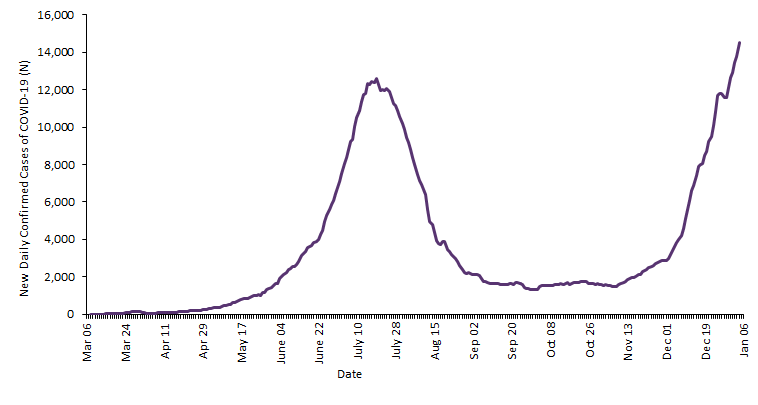New coronavirus variant causing concern as cases spike in South Africa
South Africa has reported a new variant of Covid-19, 501.V2, and a corresponding sharp rise in case numbers in the last month. This new strain is independent of the UK’s new strain.
However, the mutation and rise in cases in South Africa has gone largely unnoticed while extensive coverage was given to the new UK variant, SARS-CoV-2 (B.1.1.7), which is believed to have caused the spike of cases in the UK. The lack of attention being given to the South Africa variant may be a problem, as recent findings have shown that the South African variant is now considered more infectious than the UK variant.
South Africa experienced a decline in new Covid-19 cases after the initial first wave. However, this second wave shows a foreboding trajectory for the number of Covid-19 daily confirmed cases (Figure 1).
Tulio de Oliveira, director of KwaZulu-Natal Research and Innovation Sequencing Platform at the University of KwaZulu-Natal, and Francois Balloux, professor at University College London, have suggested that this spike in cases might be caused by the new variant more resistant to vaccines, but this has not been confirmed.
According to Balloux, the South African variant shows more spike protein mutation than the UK variant, which might help the virus escape the immune protection provided by vaccination or prior infection.
As mapping of this strain is difficult in real-time, South Africa needs support from the international community with genetic sequencing, mapping and further analysis of this variant. It also needs to be confirmed if the Pfizer and Moderna vaccines are effective against this variant of the virus.
Mutation in a virus is to be expected, especially in a virus that is widely prevalent. However, the increased contagiousness of this new variant is cause for concern. Researchers suspect that variant 501.V2 is more infectious based on its dominance compared with other strains of SARS-CoV-2.
This variant is expected to be the most prevalent in Johannesburg and other surrounding provinces in South Africa. A similar pattern was reported in the UK, where the B.1.1.7 strain quickly dominated the other strains in London and the surrounding areas.
On a positive note, vaccination is underway in Europe and North America. Unfortunately, it is unclear if the currently available vaccines will be effective against these strains. As such, at-risk countries should exercise caution. In the meantime, travel from South Africa needs to be restricted until researchers have a clearer understanding of the variant’s contagiousness and antibody resistance.

Figure 1: Covid-19 Daily New Cases, South Africa, 6 March 2020– 6 January 2021.
For pharmaceutical industry data, comment and analysis, visit GlobalData's Pharmaceuticals Intelligence Centre.
Market Insight from